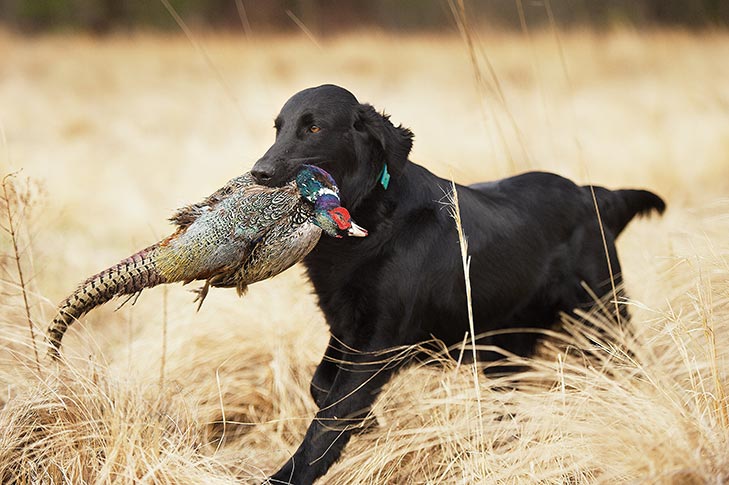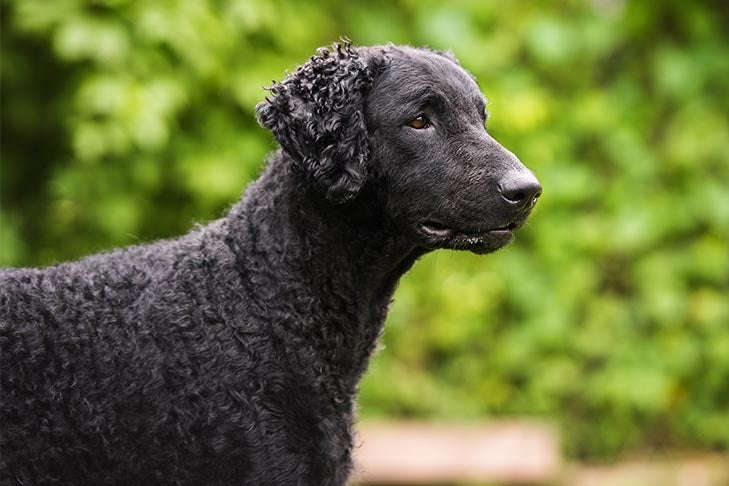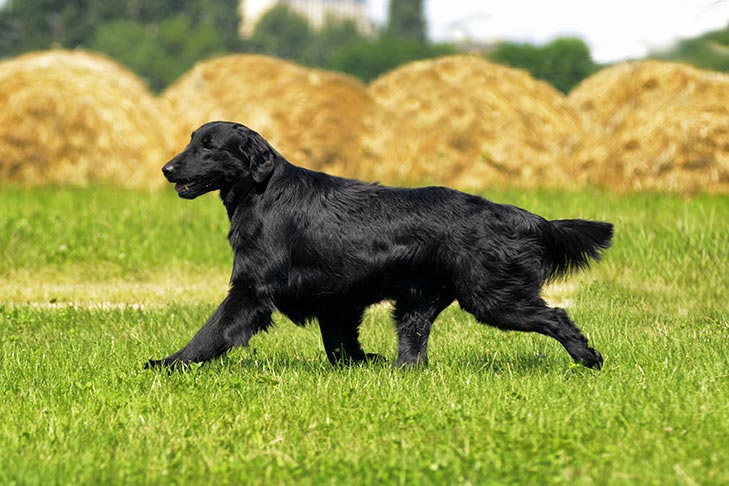
- golden retriever
- labrador retriever
- sporting group
- chesapeake bay retriever
- curly-coated retriever
- nova scotia duck tolling retriever
- flat-coated retriever
- retriever
Originally bred to help hunters, retrievers were tasked with finding birds or other game and bringing them back undamaged. For this sort of job, the dog needed a “soft,” gentle mouth, where they would carefully carry the prey without damaging it. Also required were strength and agility to traverse a rugged landscape or work in water, as well as intelligence and a great willingness to please and obey. With the development of the retriever breeds over the years, all these qualities combined to make some outstanding breeds, among which are deservedly among the most popular dog breeds today.
The retriever breeds are exceptionally smart, “biddable” (willing to learn), athletic, and sweet-tempered. As these breeds were developed for their outstanding abilities in working closely with humans, it is no wonder that they are so amazing at taking on anything you ask of them — including just being fantastic companions.
The American Kennel Club recognizes six retriever breeds in the Sporting Group. Get to know what makes each retriever breed unique.
Chesapeake Bay Retriever

The Chesapeake Bay Retriever descended from two dogs who were saved from an English brig wrecked off the coast of Maryland in 1807. Along with the crew and cargo were rescued two St. John’s Newfoundland puppies—a dingy red dog named Sailor, and a black bitch named Canton. These dogs were given to people in the local community, and they turned out to be excellent natural retrievers.
The two were not bred to each other but were interbred with other dogs in the area, and other outcrosses were made as well, probably with the Otterhound, Flat-Coated Retriever, and Curly-Coated Retriever. Eventually, this intelligent, powerfully built gundog breed was developed, with their characteristic wavy, straw- to brown-colored coat.
Curly-Coated Retriever

The Curly-Coated Retriever is considered to be one of the oldest of all the retriever breeds. They are thought to be descended from the 16th-century English Water Spaniel, the St. John’s Newfoundland, the retrieving setter, and, in the late 19th century, the Poodle.
Distinguished by their coat of small, tight, water-resistant curls, this multipurpose hunting retriever is reliable, robust, and highly intelligent. One of the more independent retriever breeds, the Curly may appear somewhat aloof, but they are always willing to please.
Flat-Coated Retriever

The Flat-Coated Retriever’s ancestors include a crossbreed emerging from the Newfoundland that was then bred to setters, sheepdogs, and spaniel-like water dogs. Closely related to the Labrador Retriever but leaner and more elegant, the breed has a lustrous, flat-lying coat.
This coat comes in solid black or liver, with feathering at the legs and tail. The distinctive coat protects these superb retrievers from harsh weather, icy water, and punishing ground cover. Another breed hallmark is the long head—unique among retrievers—that projects a smart and kindly expression.
Golden Retriever

The Golden Retriever originated in the Scottish Highlands in the late 1800s. The breed’s founder, a member of the gentry named Dudley Marjoribanks, later known as Lord Tweedmouth, wanted a superb retriever who would be well-suited to the Scottish climate. He started with the lone yellow puppy he obtained from a litter of black Wavy-Coated Retrievers whelped in southern England in 1864.
Eventually, he bred that dog to a female Tweed Water Spaniel (a breed now extinct). Several yellow pups that resulted became the foundation for a distinctive line of very talented yellow retrievers that became known as excellent working dogs. Since then, the breed’s beauty, high intelligence, physical abilities, and loving personality have earned the Golden devotees.
Labrador Retriever

The Labrador Retriever probably originated not in the area of Labrador, in northeastern Canada, but on the adjacent island of Newfoundland. Going back to the 1600s, fishermen in Newfoundland worked with sturdy, eager-to-please, water-loving dogs who helped haul in lines and nets and retrieved fish that fell off of hooks. As more people settled in the St. John’s area of Newfoundland, the dogs’ excellent retrieving abilities made them very useful and popular hunting companions.
Some of these “St. John’s dogs” were brought back over to England. By the 1800s, they became prized sporting dogs for the aristocracy. Today, the Lab is one of the most popular breeds in the U.S. and many other countries, as well. Their intelligence, solid build, versatility, gentle and pleasant nature, and desire to please make them excel at many roles in addition to a hunting dog, including as a guide dog, for search-and-rescue work, therapy work, narcotics detection—and, of course, as a top-notch all-around companion.
Nova Scotia Duck Tolling Retriever

The Nova Scotia Duck Tolling Retriever was developed in the Little River Harbour area of Nova Scotia around the beginning of the 19th century. This compact, agile, alert, and intelligent breed was developed for an unusual method of hunting waterfowl, known as “tolling,” where the dog’s playful action of retrieving a stick or ball draws the curiosity of birds that are out on the water, luring them into the shoreline.
This behavior was first noted in the wild, where foxes were seen to play along the shore so as to attract their waterfowl prey. Inspired by the success of the foxes, hunters trained their dogs to mimic this ploy by throwing sticks and rocks for the dogs to retrieve. The Toller’s attractive, water-repellent double coat is any shade of red, often with white markings.
Finding a Retriever Puppy
Do you see a retriever in your future? Learn more about each breed by reaching out to a reputable breeder.
Once you decide to look for a retriever puppy of your own, AKC Marketplace can connect you with a responsible breeder. Retrievers do best in homes where they can be active, and most are great companions and friendly family dogs.
At AKC Marketplace, we can help you find your dream dog. You can find AKC-registerable puppies from responsible, passionate breeders, and we provide the tools you need for every step of the process. Visit marketplace.akc.org to start connecting with dog breeders in your area!

